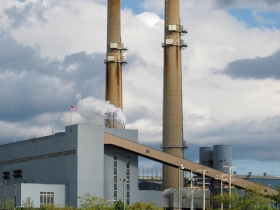Critics Say WEPCO Proposal Would Over-Charge Customers
Valley plant conversion to gas will mostly serve businesses yet 90% of cost is charged to residential customers, they charge.

Menomonee Valley Power Plant
A Public Service Commission economist charges that a proposal by the Wisconsin Electric Power Co. to hand a $73 million bill – about 90 percent of the total project cost — to residential customers for upgrades in its Menomonee Valley Power Plant is unjustified. John Feit, an economist with the PSC, says Wepco’s Valley plan mostly serves businesses with steam power it delivers while residents will pay most of the costs. He contends the proposal’s cost structure was based on “no analysis” by the company.
At issue is who should pay to convert the Valley power plant from a coal-fired facility to a natural gas-fired facility. The conversion will cost about $80 million and WEPCO wants to charge electric customers $73 million and steam customers just $7 million. Feit testified before the PSC earlier this month, as did a representative of the Citizens Utility Board, which also raised questions about the proposal.
The proposal is favored by the Metropolitan Milwaukee Association of Commerce, whose membership includes most of the businesses who benefit from the steam power, which serves 450 customers in the Downtown area. WEPCO contends its proposed cost sharing is justified because without the conversion it would have to pay $160 million on new transmission facilities to maintain the reliability of the utility’s electric system..
But Feit contends that if it were not for the steam customers, the Valley plant would be retired. He also says the cost-sharing is based on 45-year-old assumptions that are no longer true. WEPCO’s allocation simply is a carryover from 1968 and 1969, when the plant’s generating units opened, he said. It was assumed then that the vast majority of production from the plant would be electricity, not steam. “The roles of electric production and steam production at Valley have completely reversed since the two Valley units were constructed in 1968 and 1969,” Feit noted at the hearing.
While WEPCO argues that it needs the Menomonee Valley Plant’s continued production to maintain stability of the electrical grid, another expert testified that there already are reliability concerns at the Valley plant. “The system as it exists today… violates (national) reliability standards,” said Richard Hahn a principal consultant with La Capra Associates Inc., an energy consulting firm. Hahn testified on behalf of CUB.
Hahn said said that fewer Valley upgrades were needed than WEPCO contends, and that the utility can mitigate reliability concerns without incurring capital costs for transmission upgrades. “Therefore,” he said, “a strong case can be made that none of the cost of gas conversion should be allocated to electric customers.”
If the PSC does allocate some of the cost to electric customers, that cost at the most should be in the range of 11 percent to 22 percent, he said.
Gretchen Schuldt is a board member of CUB and a frequent contributor to Urban Milwaukee.






















Excellent article. Just one of the many ways individual citizens are footing the bill for the corporate welfare system in the US.
It’s interesting we see corporate welfare when it benefits the city of Milwaukee and the residents nearby.
When the Oak Creek power plant was getting gold-plated, I must have missed the outrage. C’mon now, everyone get angry that we’re closing a mercury factory, dumping right into Lake Michigan.
Don’t ya just love it? A monopoly that is a stock corporation that makes its annual pilgrimage to the PSC to have it rubber stamp their rate increases in order to guarantee a profit.
There are a lot of people that have been pushing We Energies to convert the power plant to natural gas, given that mothballing the plant is unlikely given that it provides steam heat to over 450 buildings. The plant was built primarily for electric, and the waste heat was converted to steam to power downtown buildings, which made sense at the time. Given that the cleaner and newer Oak Creek Plant is running at very low capacity right now, there is no need to generate electricity at the Valley Plant anymore. That plant has to create electric right now to generate the steam, and this electric is largely dumped into the river as waste heat–creating near boiling water temperatures in the summer that essentially are lethal to fish 20% of the time and create a 25 acre “dead zone”. We Energies decided to not decouple the steam from the electricity generation processes, which would address this issue and allow for dramatically reduced usage of natural gas and improved water and air quality. If they decoupled the processes (which would cost an additional $70 million in the short term), then it would likely make it legally necessary for the steam customers to pay their full rates (which are now paid for largely by residents or 92% of their costs). Decoupling makes the most sense both environmentally, economically, and rationally. Essentially, we are wasting natural gas (and $$) to create electricity we don’t need to create steam for businesses that don’t pay for it.